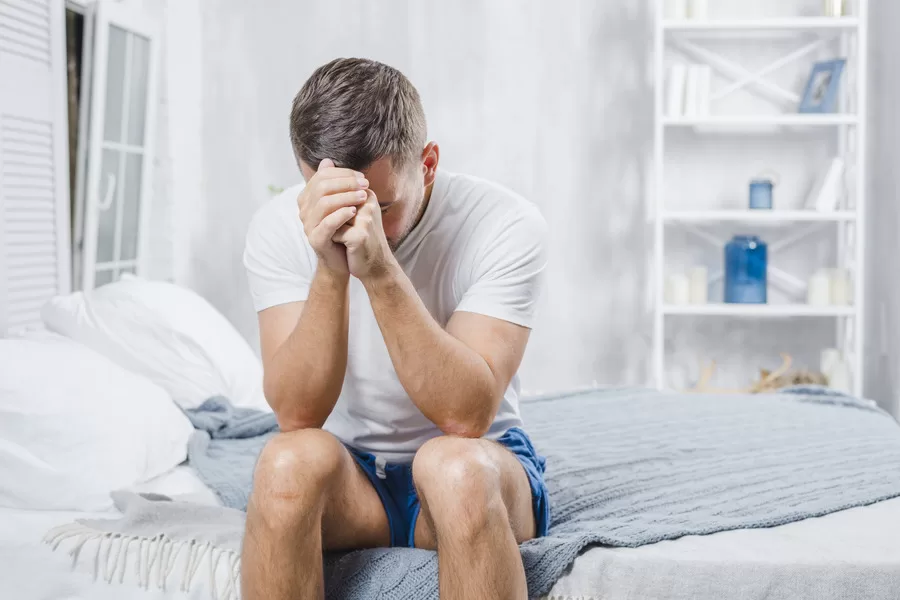
Feeling tired, out of mood or just not yourself? These may indicate low testosterone, a prevalent but sometimes disregarded issue in males and other populations. Insomnia and poor sleep quality aren’t the only aspects of low testosterone that you experience; it also has an impact on your physical and sexual abilities. How to fix it?
Testosterone: an Essential Hormone
Think of testosterone as a chief hormone, especially in men’s health, but also important for women. It is mostly produced in the testicles of males and in lower amounts in the ovaries of women. It functions as a builder and regulator for the body. Although it is well known for forming masculine traits, its influence extends far beyond and affects general, mental, and physical health.
Testosterone is the driving force underlying the transition of boys into men starting in their adolescence. It causes the voice to become deeper, the muscles to develop, and the body hair to sprout. However, its job extends into maintaining bone health, influencing how the brain works and feels, and even guiding how fat is spread around the body. For men’s fertility, it’s crucial too, being central to sperm production.
While much is said about testosterone in men, it’s vital in women too, contributing to muscle strength, bone density, and libido. Imbalances can affect women’s health significantly, leading to concerns similar to those in men. Understanding its level and function is important for both sexes for overall health and well-being.
Testosterone’s story is not just about aging or masculinity. It’s a fundamental aspect of human biology, influencing various aspects of health and well-being. Whether it’s understanding its role, noticing signs of imbalance, or seeking treatment, a deeper knowledge of testosterone can lead to better health and improved quality of life.
Symptoms of Low Testosterone Levels
When the body produces less testosterone, it is called low testosterone or “hypogonadism.” A man’s reproductive health, as well as the preservation of muscle and bone mass and emotional balance depend on this hormone. Low levels have a significant impact on life and can cause a number of health problems.
Characteristic Symptoms of Low Testosterone
- Diminished Interest in Sex: A notable decrease in libido or sexual activity.
- Erectile Disfunction: Difficulties with achieving or maintaining an erection.
- Ongoing Exhaustion: A persistent sense of tiredness that rest doesn’t seem to fix.
- Reduced Muscle Strength: A decrease in muscle mass and overall physical strength.
- Brittle Bones: Lowered bone density, leading to an increased risk of fractures.
- Emotional Swings: Experiences of sadness, irritability, or moodiness.
- Reduced Body Hair: A noticeable thinning or loss of hair on the body.
- Memory and Concentration Issues: Difficulties with focusing or remembering may also occur.
Underlying Causes of Low Testosterone
A variety of factors can lead to the reduction of testosterone, including:
- Progressive Aging: Natural testosterone production tends to decrease with age, particularly noticeable in men post-30 years.
- Hormonal Imbalances: Issues with the testicles or with hormone-regulating glands can lead to decreased levels.
- Health Conditions: Diseases like diabetes, obesity, and metabolic syndrome can negatively affect testosterone production.
- Medication Effects: Certain drugs, especially those used for hormone-related treatments, might suppress testosterone.
- Inherited Disorders: Genetic conditions can predispose individuals to lower testosterone levels.
- Lifestyle Factors: Suboptimal diet, insufficient physical activity, and excessive stress or alcohol intake can all contribute to lower testosterone.
Understanding and managing low testosterone is crucial for maintaining health and quality of life. Approaches to treatment vary but may include hormone replacement therapy, lifestyle changes, or addressing any contributing health conditions. For accurate diagnosis and personalized treatment, consulting with healthcare professionals is essential.
Overcoming Low Testosterone
Personalized Testosterone Supplementation Techniques
- Strategic Muscle Injections: Like a timely boost, these injections are designed to give your body the testosterone it needs directly into the bloodstream.
- Steady-Supply Skin Patches: Stick these patches on your skin and let them work their magic, providing a consistent dose of testosterone throughout the day.
- Easy-Apply Gels: No fuss here, just apply the gel on your skin, and let it absorb the testosterone gradually.
- Discreet Oral Tabs: If you prefer keeping it simple, oral testosterone might be your go-to, although it’s good to understand the pros and cons with your doctor.
- Lasting Pellet Implants: For a long-term solution, consider pellets that are placed under the skin, slowly releasing testosterone and keeping levels steady.
Boosting Testosterone the Natural Way
- Get Moving: Whether it’s lifting weights or going for a run, exercise can ramp up your testosterone levels.
- Eat Smart: Focus on a balanced diet rich in proteins, fats, and nutrients that support hormone health.
- Manage Your Weight: Keeping a healthy weight is not just good for your heart; it’s great for your testosterone levels too.
- Rest Well: Never underestimate the power of a good night’s sleep; it’s crucial for your hormonal balance.
- Stay on Top of Chronic Conditions. Proper management of conditions like diabetes or high blood pressure can positively influence your testosterone.
- Medication Check. Discuss with your doctor if any medications you’re taking might be impacting your hormone levels and explore alternatives if necessary.
Remember, overcoming low testosterone is a journey unique to each individual. It involves understanding your body, consulting with healthcare experts, and sometimes a bit of trial and error to find out what works best for you. Stay informed, stay patient, and take proactive steps towards a healthier, more vibrant you.
Possible Side Effects
Typical Side Effects
Treatments can lead to various unwanted effects. Mild side effects may include headaches, sleep disturbances, or digestive issues. More severe reactions might involve intense pain, significant allergic reactions, or long-term health effects. It’s essential to recognize these possibilities early on to manage and mitigate them effectively.
Your healthcare provider can give you a comprehensive list of possible side effects based on the treatment, your health history, and other medications you may be taking. Always report any side effects experienced to ensure your safety and adjust treatment as necessary.
Special Caution Situations
- Those Expecting or Nursing: If you’re pregnant or breastfeeding, certain drugs and therapies may pose risks to your child. It’s crucial to discuss all your current treatments and any new ones you’re considering with your healthcare provider to understand the risks and necessary precautions.
- Individuals with Allergic Histories: Allergies can turn some treatments from helpful to harmful. Whether it’s a known drug allergy or a reaction to certain materials (like latex), sharing this information with your doctor helps prevent avoidable complications.
- People with Ongoing Health Issues: Conditions such as diabetes, heart disease, or immune disorders can complicate treatment options. Some treatments might worsen these conditions or interact negatively with current medications. A detailed discussion with your healthcare provider about your medical history and any ongoing treatments is crucial for a safe and effective treatment plan.
Personal treatment plan
Ensure you have a detailed discussion with your healthcare provider about the nature of the treatment, what to expect during the process, potential risks and benefits, and how it fits into your overall health strategy. Knowing how to prepare for the treatment, what the recovery process looks like, and any lifestyle changes or follow-up care required is also crucial. The more informed you are, the better equipped you’ll be to make decisions and handle your treatment journey.
How long can treatment take?
Tailoring Therapy to Fit You
Testosterone therapy isn’t a quick fix, and it’s not the same for everyone. Some might need just a short period of treatment; others may need it for a longer time. Factors like your age, health, and specific health goals make your treatment unique. Your doctor will set up a plan based on these factors and adjust it over time, depending on how well you’re responding to the therapy.
Setting Clear Health Goals
What do you want to get out of your therapy? More energy, better mood, or something else? Let your doctor know. They will use these goals to figure out the best approach to your therapy and keep adjusting as you move forward, always aiming to get you closer to these goals.
The Role of Regular Health Checks
Staying in touch with your doctor and going for regular health checks is crucial. These visits are when your doctor sees how you’re doing and whether your therapy needs any tweaking. They might do some tests to check on your health and see how your body is responding to the therapy. This way, they can keep your treatment right on track.
Supporting Your Treatment with Healthy Habits
The way you live your life plays a big part in how well your treatment works. Eating well, being active, getting plenty of rest, and handling stress well can all help make your therapy more effective. They can also help you feel better overall. Talk with your doctor about which lifestyle changes could be most helpful for you.
Conclusion
Identifying low testosterone involves recognizing a spectrum of symptoms from diminished sexual interest to physical fatigue and emotional fluctuations, necessitating a comprehensive health evaluation. Testosterone’s role extends beyond male sexuality, impacting bone density, muscle mass, mood regulation, and cognitive function, making it a critical hormone for both genders.
A variety of personalized treatment avenues exist, from direct hormone supplementation to lifestyle modifications aimed at enhancing natural testosterone levels, each tailored to the individual’s unique health profile. Ongoing dialogue with healthcare providers, regular health assessments, and adaptable treatment plans are crucial to navigating the complexities of testosterone therapy effectively and safely.
FAQs
Diminished testosterone can lead to changes in mood, decreased focus, and a lower sense of well-being.
Regular strength-based activities, sufficient sleep, and a diet with ample vitamins and minerals, particularly zinc and vitamin D, can help enhance testosterone levels.
Elevated testosterone levels can lead to health issues, including erratic mood swings, skin conditions, and increased cardiovascular risks.
Evaluate potential health impacts, lifestyle changes needed, and the necessity for continuous medical monitoring. Consultation with a healthcare provider is crucial for a tailored approach.







